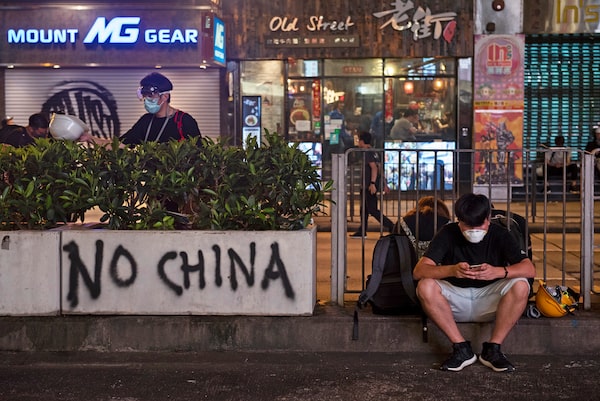
China has always viewed Hong Kong as being Chinese soil.Miguel Candela/SOPA Images/Sipa USA via Newscom
Frank Ching is a Hong Kong-based journalist.
Anti-extradition protests in Hong Kong are extending into their third month – ostensibly directed at the regional government, but very much aimed also at Beijing. But repercussions are being felt around the world, with myriad parties being inevitably drawn into the conflict.
On Aug. 1, the board of British Columbia’s Simon Fraser University’s student society, which represents 25,000 undergraduates, voted to stand up to “bullying” and “harassment” after a message board full of posters and notes that mainly expressed solidarity with Hong Kong’s demonstrators was partly torn down three nights in a row. The week before, on the other side of the globe, the student union at the University of Queensland in Brisbane, Australia, voted to support pro-democracy protesters and condemn the “subversion of democratic rights and freedoms in both Hong Kong and the People’s Republic of China” by their governments. And in nearby New Zealand, the University of Auckland has launched an investigation into a confrontation caught on film between three male mainland students and a female Hong Kong student, who was shoved and fell to the ground.
Chinese consulates in both Brisbane and Auckland have praised mainland students for their “spontaneous patriotism,” but so far, the consulate in Vancouver has been quiet.
The events expose the raw wounds that have produced a gap in national identity – a conflict between Hong Kong and mainland China – that is at the core of the protests. And this can be explained, at least in part, by the handover of Hong Kong from the British to the Chinese in 1997.
From China’s standpoint, Hong Kong had always been Chinese soil; through 150 years of British rule, its people remained Chinese, regardless of British law. And this fit nicely with Britain’s policy, which was to see to it that the millions of Chinese “British citizens” in Hong Kong could not move to the United Kingdom.
Nationality and immigration laws were changed to accommodate this. In the 1980s, Britain created a new category of citizens, called British Dependent Territory Citizens, transforming United Kingdom people into Hong Kong people. When Hong Kong was no longer a British dependent territory, yet another new category was created – British National (Overseas) – which doesn’t include the right to live in Britain, or pass citizenship on to the next generation. And in China, a year before the handover, the Standing Committee of its National People’s Congress issued “Explanations” of how China’s Nationality Law would be applied in Hong Kong. That is to say, the law would mean different things in different parts of the country, a highly unusual legal situation.
The “Explanations” introduce a concept missing in the nationality law itself – that of “Chinese descent.” Thus, any Hong Kong resident of Chinese descent who was born in Hong Kong or China is a Chinese national, regardless of whether he or she possesses Canadian, Australian, British or other nationality. That means people who were foreign nationals were automatically transformed into Chinese nationals in 1997.
China and Britain both wanted the people as well as the territory to be transferred wholesale. The millions of people in Hong Kong were considered little more than chattel.
Offering people an option on their nationality after their land is transferred isn’t a novel idea. It happened on Chinese territory when the Qing dynasty ceded Taiwan to Japan in 1895 in the Treaty of Shimonoseki. Japan gave the inhabitants of Taiwan two years to decide if they wanted to move – presumably to live on Chinese territory – or to stay. If they stayed, two years later, they would assume Japanese nationality. If imperialist Japan was enlightened enough to do this in the 19th century, it seems the People’s Republic of China could have done at least as much.
Even if Britain adamantly refused to admit people who had been told they were British since birth, that wasn’t China’s problem. Hong Kong people could still have chosen to go to other countries, as many of them did eventually – largely to Canada, but elsewhere, too.
As it is, China today doesn’t recognize the Canadian nationality of Hong Kong Chinese who emigrated there.
If there had been a semblance of choice regarding Chinese nationality, then the sense of resentment today would not be as great. After all, Hong Kongers would have voluntarily decided to become citizens of the People’s Republic of China. They would not feel that the nationality had been foisted on them and, consequently, that their freedom was threatened – the root cause of these protests that show no sign of abating.
Keep your Opinions sharp and informed. Get the Opinion newsletter. Sign up today.